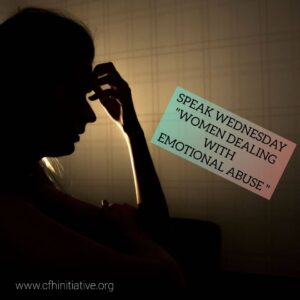Speak Wednesday
Rape Culture

The Merriam Webster Dictionary defines rape as any unlawful sexual activity and usually sexual intercourse carried out forcibly or under threat of injury against a person’s will or with a person who is beneath a certain age or incapable of valid consent because of mental illness, mental deficiency, intoxication, unconsciousness, or deception. Rape was long considered to be caused by unbridled sexual desire, but it is now understood as a pathological assertion of power over a victim. Culture on the other hand has been defined by The Centre for Advanced Research and Language Acquisition (CARLA) as shared patterns of behaviors and interactions, cognitive constructs and understanding that are learned by socialization.
Rape culture can thus be defined as an environment in which rape is prevalent and in which sexual violence against women is normalized and excused in the media and popular culture (WGC, 2019). Behaviors associated with rape culture commonly include victim blaming, slut-shaming, sexual objectification, trivializing rape, denial of widespread rape, refusing to acknowledge the combination of these, etc. Rape culture pressures women to sacrifice their dignity, freedoms and opportunities in order to stay safe, because it puts the burden of safety on women’s shoulders, and blames them when they don’t succeed. According to the “Release of the findings of the Nigeria Violence Against Children Survey” by United Nations Children’s Fund (UNICEF) Nigeria, one in four girls and one in ten boys in Nigeria had experienced sexual violence before the age of 18 and over 31.4 percent of girls said that their first sexual encounter had been rape or forced sex of some kind as reported by Positive Action for Treatment Access.
This goes without saying that indeed there is a rape culture in Nigeria, a society where victims of rape are blamed and shamed and the perpetrators are not punished, a society that blames the woman for her partner’s infidelity, where we think it is okay for a husband to forcefully have sex with his wife because there is a believe that she has no right to consensual sex. Yes, the prevalence of rape culture in Nigeria is high and it is time we did away with this system that espouses the idea of women as possessions or objects and develop instead a society that sees the woman as a human with rights, consents and abilities.
The Women’s & Gender Centre outlines several ways in which Rape Culture can be combated. These include but are not limited to:
· Avoid using language that objectifies or degrades women.
· Speak out if you hear someone else making an offensive joke or trivializing rape
· If a friend says she has been raped, take her seriously and be supportive.
· Think critically about the media’s messages about women, men, relationships, and violence.
· Be respectful of others’ physical space even in casual situations.
The issue of rape culture cannot be fixed in one day. However, advocacy campaigns have brought attention to the problems fueling rape culture and have helped women to come together in opposition to it. Because rape culture also derives some of its power from unconscious biases and hidden assumptions, simply drawing attention to it is a step towards changing it.
Yet the Government on its own hand can do much more in this fight against violence on women and girls by amongst others creating stricter laws and punishments for perpetrators of gender based violence especially Rape, by enforcing the implementation of certain laws like the Violence against Persons (Prohibition) Act in all states of the nation and by providing fundings to support provision of services for victims of violence.
CFHI since inception has been at the forefront in the fight against violence against women and girls, through funded projects, street/online campaigns, annual activitism called up by recognised international bodies, etc. Recently CFHI being a member of the International Network to End Violence Against Women and Girls (INEVAWG) whose vision is to create a world where all women and girls live without violence and enjoy equality, autonomy, freedom, and justice hosted a National Consultation on violence against women and girls funded by INEVAWG. It had in attendance major key actors ranging from the legislative & judiciary arms of government, CSOs, female vanguard groups all over the country and beyond to share relevant and current information about VAWG, propose solutions and develop action plans to eliminate all forms of violence against women and girls in the public and private spheres.
Speak Wednesday is an initiative of Centre for Family Health Initiative (CFHI) to address issues of gender based violence and gender bias. Join us every Wednesday on all our social media platforms for more episodes.

















